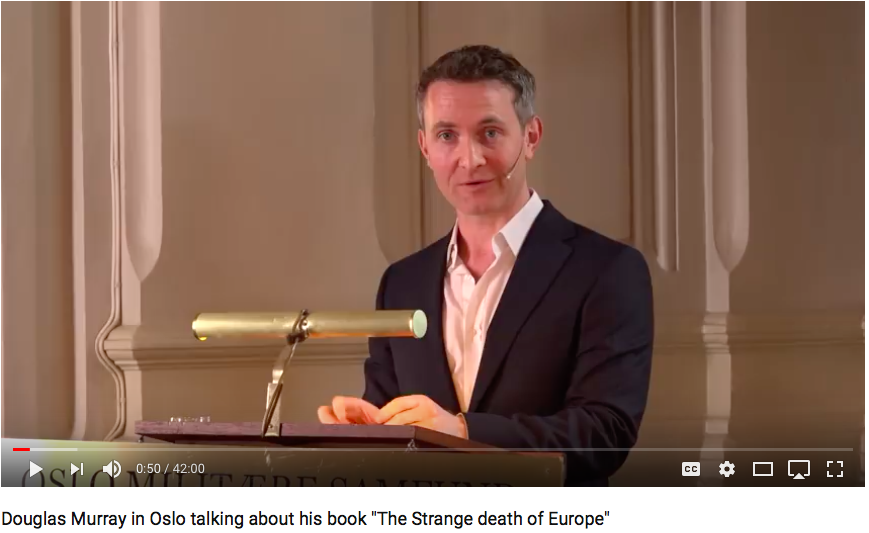|
Consistent with every speech he gives, this is a wonderful talk by Douglas Murray. The center of the bullseye is for Douglas, as always, a concern about politics and existentially important cultural issues. He is not really doing philosophy (much less epistemology). So this may seem terribly unfair and pedantic. Nevertheless my interest is epistemology and so hearing the grave intonations of Douglas Murray utter such a philosophical cliché so early on, I felt the need to say something on the matter. At around the 40s mark into the speech above, Douglas says:
“It’s very easy to be a critic. It’s very hard to create. Yet it’s creation, not criticism that builds societies and indeed inspires people. And gives life meaning.” The irony is Douglas is one of the most brilliant critics of our time! His books are excellent critiques of much received wisdom, politics, politicians and some of the most pressing global issues. The cliché I wish to highlight is this problem where people distinguish creation from criticism with a bright line and regard criticism as somehow bad – or easy and creativity as only ever good. What Douglas I assume means, and what I guess most people mean when they have a go at “criticism” is something more like “insults”. Insults are not criticism. Or mere contradiction is not a criticism. “You’re wrong” barely makes the grade for actual criticism. So what is criticism actually? Well firstly it’s a creative act. Hence the way in which it cannot be divorced from creativity. (And creativity, for what it’s worth, can only become useful innovation when a careful application of criticism is applied. Not all flights of imaginative “creativity” are good.). Criticism is an explanation of how something is wrong or bad or deficient and why. Of course this is in the ideal case. Sometimes criticisms fall short and might be “bad explanations” or only partially make the case that some idea or creative thing has a weakness or flaw in some way. The criticism might not be valid. Or even when it is valid is might not be fatal because there may be no alternatives on offer. What Douglas does in the rest of his speech is criticize. He’s a critic! He criticizes politicans and political systems, he criticizes lots of ideas and practices. He criticizes whole cultures (even his own) – in short he is a grand critic in the great tradition of British orators. But he creates all these wonderful criticisms and defends them with good explanations. Some I disagree with, but the overwhelming majority are good observations of actual things going wrong and how and why. And that’s what great criticism is. When Douglas devised this speech, or speeches like it, and wrote his books – he created. But I’m sure he made more than one draft. He criticized his own work. He was a critic of his own work. Did he find that easy, I wonder? I doubt it. And to come up with this long list of deeply insightful criticisms of European Union policies – did that not take great creativity? Here is the key: someone who says, “Douglas, you’re wrong. You’re a fool” is not an actual critic. They’re something else. Absent further good explanation they’re just a mean person! Critics are not necessarily mean. And being a mean, cruel or insulting person doesn’t make you a critic. So we need both. What builds society is indeed creation. But only when coupled with criticism. An imaginative architect can conjure the most fantastic design. “How wonderfully creative you are!” people may exclaim. But when the engineer arrives to say “That wall there is not physically possible. It simply cannot support the roof (for reasons x, y and z)” this criticism is neither bad nor easy. The engineer may have to call on specific pieces of physics and other sciences to create an explanation of how the design fails. Applying general principles to specific cases takes creativity. The creative design in this case may indeed have been the easier thing and, ultimately, the bad thing. Creativity uncoupled from criticism is just imagination. Creativity coupled with criticism brings innovation. So let us alter Douglas’ introduction just a little, “It’s not easy to be a critic. Here I stand, bravely pointing out some difficult truths of our time. It’s very hard to create such criticisms of ideas some people hold so dear. Yet it’s this kind of creative criticism that builds societies and indeed inspires people. And gives life meaning.”
2 Comments
Tom Robinson
9/26/2018 09:59:01 am
I see the role of explicit criticism as defending against ideas *one doesn’t like*. It’s really only to be used in self-defence or to keep the peace. This latter aspect is the role of the public critic – to give critical tools to the public either to articulate their pre-existing misgivings or to arm them against something they haven’t yet encountered.
Reply
Leave a Reply. |
Archives
December 2023
CriticismThe most valuable thing you can offer to an idea Categories |

 RSS Feed
RSS Feed